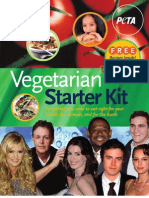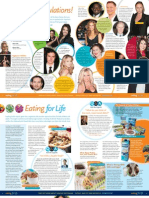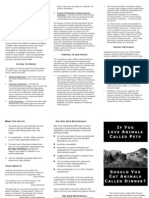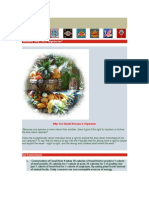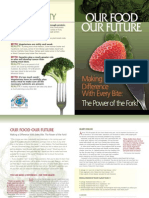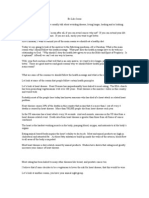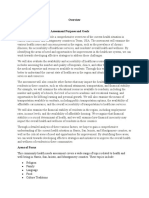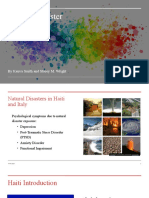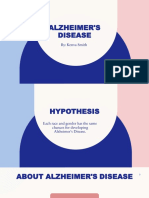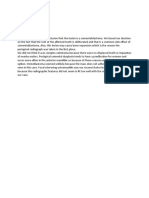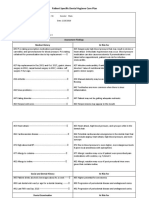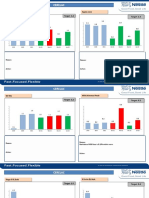0 ratings0% found this document useful (0 votes)
27 viewsWTH Documentary
WTH Documentary
Uploaded by
api-522555065This documentary review summarizes the documentary "What the Health" which explores the link between diet and disease. The documentary interviews doctors and examines research showing that a plant-based diet can reverse diseases like heart disease and diabetes. It finds processed meats increase cancer risk and dairy does not protect bones. The documentary also suggests government and industry organizations have conflicts of interest that influence dietary recommendations. It encourages viewers to adopt a vegan diet for health, environmental, and ethical reasons.
Copyright:
© All Rights Reserved
Available Formats
Download as PPTX, PDF, TXT or read online from Scribd
WTH Documentary
WTH Documentary
Uploaded by
api-5225550650 ratings0% found this document useful (0 votes)
27 views13 pagesThis documentary review summarizes the documentary "What the Health" which explores the link between diet and disease. The documentary interviews doctors and examines research showing that a plant-based diet can reverse diseases like heart disease and diabetes. It finds processed meats increase cancer risk and dairy does not protect bones. The documentary also suggests government and industry organizations have conflicts of interest that influence dietary recommendations. It encourages viewers to adopt a vegan diet for health, environmental, and ethical reasons.
Original Title
wth documentary
Copyright
© © All Rights Reserved
Available Formats
PPTX, PDF, TXT or read online from Scribd
Share this document
Did you find this document useful?
Is this content inappropriate?
This documentary review summarizes the documentary "What the Health" which explores the link between diet and disease. The documentary interviews doctors and examines research showing that a plant-based diet can reverse diseases like heart disease and diabetes. It finds processed meats increase cancer risk and dairy does not protect bones. The documentary also suggests government and industry organizations have conflicts of interest that influence dietary recommendations. It encourages viewers to adopt a vegan diet for health, environmental, and ethical reasons.
Copyright:
© All Rights Reserved
Available Formats
Download as PPTX, PDF, TXT or read online from Scribd
Download as pptx, pdf, or txt
0 ratings0% found this document useful (0 votes)
27 views13 pagesWTH Documentary
WTH Documentary
Uploaded by
api-522555065This documentary review summarizes the documentary "What the Health" which explores the link between diet and disease. The documentary interviews doctors and examines research showing that a plant-based diet can reverse diseases like heart disease and diabetes. It finds processed meats increase cancer risk and dairy does not protect bones. The documentary also suggests government and industry organizations have conflicts of interest that influence dietary recommendations. It encourages viewers to adopt a vegan diet for health, environmental, and ethical reasons.
Copyright:
© All Rights Reserved
Available Formats
Download as PPTX, PDF, TXT or read online from Scribd
Download as pptx, pdf, or txt
You are on page 1of 13
Documentary Review by Kenva Smith
Kip Andersen, filmmaker
Neal Barnard, M.D., FACC
Milton Mills, M.D.
Michael Klaper, M.D.
Family history of major health diseases
• Cancer
• Hypertension
• Diabetes
About Kip Personal lifestyle choices to avoid disease
Andersen • No smoking
• No drinking sodas
• Get enough sleep
• Follow recommendations of major health
organizations
Processed meat can increase the risk
of cancer by 18%.
W.H.O. on Can cause colorectal cancer
processed
meat Equally as dangerous as smoking
Classified as a “Group 1” carcinogen
American Cancer
Society on
processed meats
• Recommends deli and canned
meats in their “eat healthy”
suggestions for Americans.
• A Harvard study shows that
unprocessed meats such as
chicken, eggs, and beef increase
cholesterol and cancer risks and
alter our hormones. However,
they are still a part of the healthy
suggestions page on ACA.
Link between diet and disease
• Government and media blame high sugar and high carb diet as the cause of
diabetes
• Carbs/sugar are inversely related to diabetes.
• Meat is directly related to developing diabetes
• Diabetes, cancer, cardiovascular disease, and even “dementia” are all a
result of a meat-based diet
• Harvard research shows that dairy milk does NOT protect against bone
fractures, but it does increase risk for cancer, cholesterol, and breaks.
• There is no such thing as “hormone free milk
• Regulations for milk permit up to 750,000 pus cells per cc
• Fish are “mercury sponges” that have high counts of pesticides and
herbicides in them, which all have negative health risks and associations.
• Farmed fish are not much better than wild fish.
Government &
Organization Conspiracies
• American Cancer Association initially accepted, but later rescinded
the invitation for an interview.
• American Diabetes Association interviewee did not want to talk
about diet and diabetes. Was very evasive.
• American Heart Association and Susan G Koman refused interviews.
• Dietary Recommendation Committee & check off programs aim to
get you hooked at a young age since they are funded by fast food
restaurants
• They all accept sponsorships from companies that produce food
which are linked to the diseases they try to prevent
• Pharmaceutical industry sells most of their product to livestock
farmers.
The Pig Farm
Animals live in their
own waste
Remains are taken away, ground
Kept in over-packed pens with
up, and brought back to the
sick/dead animals
farm to be fed to livestock.
Dead pigs are removed Sick animals are given
and put in bins out in the antibiotics and other
hot sun until they are medication that we will,
eventually picked up. indirectly consume.
An Environmental
Issue & Human Rights
Demographic surrounding the pig farm is
predominantly minority (Black or Hispanic).
Nearly everyone in the area has or died from
asthma, cancer, or some other disease.
No waste system or regulation for the pig farmers,
so they spray the waste into the surrounding area.
Air and water pollution for people and other
animals
• Stench spread throughout the area
• Fish and other marine life die
Go Vegan
• “All protein is made by plants. Therefore, we don’t need animal
meat. It’s all just recycled protein anyway.” – Dr. Mills
• We are severely fiber deficient rather than protein deficient, so
eat more vegetables.
• Physiologically, we are not meant to eat meat (GI tract is longer
and canine teeth are shorter). We are not true omnivores
• In a little over a week, you can reverse heart disease and
diabetes by adapting to a plant-based (anecdotal).
• If we all go vegan, it could save the U.S. about 48 trillion dollars
(which is roughly 3x the U.S. GDP).
• Kip went vegan. He doesn’t believe he’d be physically ill for
eating meat occasionally but does not want to support an
industry that takes advantage of others.
Critiques
• Very passionate • Producer and people interviewed may be
biased/have a conflict of interest
• Encouraged people to eat healthier • He shouldn't have been surprised that the
to reduce disease. people answering the phones at the non-
• Encouraged people to look at meat profits could not give him sound answers
consumption from an ethical and • Many vegan and non-vegan dietitians disagree
humanitarian point of view. with the documentary because they feel that
he “exaggerated weak data and
• Tried to give organizations a chance misinterpreted science”
to speak for themselves before he • The way they portray the information may
came to his own conclusions/pushed insight unwarranted panic and fear.
his agenda • Does not advocate for moderation in diet
Reasons I chose this
documentary
• I love nutrition and the notion
that food can be either a cure or
disease
• Curiosity about what diet-induced
diseases and links would be
uncovered
• Thought provoking
• It sheds light on human rights,
environmental, and organizational
issues I was unaware of
Questions?
You might also like
- Vegetarianism Explained: Making an Informed DecisionFrom EverandVegetarianism Explained: Making an Informed DecisionRating: 5 out of 5 stars5/5 (4)
- Nutrition Perspectives Sterling AndersonDocument7 pagesNutrition Perspectives Sterling Andersonapi-548841590No ratings yet
- Eating Meat Is Bad For You Et AlDocument8 pagesEating Meat Is Bad For You Et AlxeoxNo ratings yet
- Nutrition in A NutshellDocument12 pagesNutrition in A NutshellVegan FutureNo ratings yet
- Veg 297Document24 pagesVeg 297Mangesh DeherkarNo ratings yet
- Vegetarian: Starter KitDocument24 pagesVegetarian: Starter KitBennychitzNo ratings yet
- Assignment 3 HeDocument11 pagesAssignment 3 HeKande Vidya sagarNo ratings yet
- Vegetarian Starter Kit (Compassion Over Killing)Document24 pagesVegetarian Starter Kit (Compassion Over Killing)Vegan Future100% (3)
- Vegan Starter KitDocument11 pagesVegan Starter KitBradley Raymond WaltmanNo ratings yet
- Iva PPTDocument64 pagesIva PPTJashandeep SinghNo ratings yet
- Vegetarianism Is The Practice of Abstaining From The: Meat Red Meat Flesh Animal By-Products Animals Processed For FoodDocument10 pagesVegetarianism Is The Practice of Abstaining From The: Meat Red Meat Flesh Animal By-Products Animals Processed For FoodLisii AlionaNo ratings yet
- CCHU9005 Food and Values L3 - Eating Meat: Joe Y. F. Lau Department of Philosophy 2021Document29 pagesCCHU9005 Food and Values L3 - Eating Meat: Joe Y. F. Lau Department of Philosophy 2021Pakhin LaiNo ratings yet
- Annotated BibliographyDocument6 pagesAnnotated BibliographyRiley WilliamsNo ratings yet
- Why Go VegetarianDocument2 pagesWhy Go VegetarianHarsrajNo ratings yet
- If You Love Animals, Don't Eat ThemDocument2 pagesIf You Love Animals, Don't Eat ThemVegan FutureNo ratings yet
- Big Question AreliDocument4 pagesBig Question Arelidpreston1441No ratings yet
- Please Don't Eat the Animals: All the Reasons You Need to Be a VegetarianFrom EverandPlease Don't Eat the Animals: All the Reasons You Need to Be a VegetarianRating: 3.5 out of 5 stars3.5/5 (3)
- A Whole Food Plant Based Diet3Document29 pagesA Whole Food Plant Based Diet3Tim Schlank100% (2)
- Vegetarian PowerPointDocument18 pagesVegetarian PowerPointRiley WilliamsNo ratings yet
- Research Findings ON Veg & Non Veg DietDocument47 pagesResearch Findings ON Veg & Non Veg Dietbestread67No ratings yet
- Article - Vegetarianism vs. MeatDocument2 pagesArticle - Vegetarianism vs. Meatdeuce R7No ratings yet
- Quick Vegan FactsDocument5 pagesQuick Vegan Factsefisher26No ratings yet
- DR, William T.Jarvis "Why I Am Not A Vegetarian"Document13 pagesDR, William T.Jarvis "Why I Am Not A Vegetarian"tommy jhonNo ratings yet
- Plant Based Eating Week 21Document4 pagesPlant Based Eating Week 21Rhea RaichuraNo ratings yet
- VegetarianDocument59 pagesVegetarianRatnesh MishraNo ratings yet
- 4-Week Meal Plan by Dr. VeganDocument61 pages4-Week Meal Plan by Dr. VeganSofia Lucia Lubiana MirabelliNo ratings yet
- Our Food Our FutureDocument12 pagesOur Food Our FutureLijahdiaNo ratings yet
- Healthy at Last: A Plant-Based Approach to Preventing and Reversing Diabetes and Other Chronic IllnessesFrom EverandHealthy at Last: A Plant-Based Approach to Preventing and Reversing Diabetes and Other Chronic IllnessesRating: 3.5 out of 5 stars3.5/5 (1)
- Be Like Jesus SermonDocument5 pagesBe Like Jesus SermonMichele CukeNo ratings yet
- 50 Reasons Why I'm A VegetarianDocument3 pages50 Reasons Why I'm A VegetarianUgur Onder BozkurtNo ratings yet
- Success In the Vegetarian Eatery: How to Start and Run Your Own Vegetarian Food BusinessFrom EverandSuccess In the Vegetarian Eatery: How to Start and Run Your Own Vegetarian Food BusinessNo ratings yet
- Vegetarianism Essay ThesisDocument4 pagesVegetarianism Essay Thesislizsimswashington100% (1)
- Vegan - The Healthiest DietDocument32 pagesVegan - The Healthiest DietVegan Future100% (4)
- Your Choice 3Document16 pagesYour Choice 3giovannagarritanoNo ratings yet
- Sacred Cow: The Case for (Better) Meat: Why Well-Raised Meat Is Good for You and Good for the PlanetFrom EverandSacred Cow: The Case for (Better) Meat: Why Well-Raised Meat Is Good for You and Good for the PlanetRating: 4 out of 5 stars4/5 (3)
- Should We All Be VegetariansDocument9 pagesShould We All Be VegetariansWeslley RodiguesNo ratings yet
- What Does It Mean To Eat Ethically 3f Corrected Essay 2Document5 pagesWhat Does It Mean To Eat Ethically 3f Corrected Essay 2api-302035335No ratings yet
- Get Healthy With Heather MillsDocument68 pagesGet Healthy With Heather MillsVegan Future100% (1)
- Vegetarian PDFDocument16 pagesVegetarian PDFRiley WilliamsNo ratings yet
- Non VegetarianDocument14 pagesNon VegetarianSyed Shahzaib RazaNo ratings yet
- Dietary Trends From Our AncestorsDocument31 pagesDietary Trends From Our AncestorsCarlos RodriguezNo ratings yet
- Healthy Veggie Kids GuideDocument40 pagesHealthy Veggie Kids GuideVegan FutureNo ratings yet
- Eat Right for Life: How Healthy Foods Can Keep You Living Longer, Stronger and Disease-FreeFrom EverandEat Right for Life: How Healthy Foods Can Keep You Living Longer, Stronger and Disease-FreeNo ratings yet
- ImmoralityDocument3 pagesImmoralityapi-335906819No ratings yet
- Carnivore Diet - Is It HealthyDocument15 pagesCarnivore Diet - Is It HealthyjlopezvanclNo ratings yet
- The Advantages of Vegan DietDocument5 pagesThe Advantages of Vegan DietHermanto MarceloNo ratings yet
- What Diet Is Best For Me?: by Nicholas J. Gonzalez MDDocument55 pagesWhat Diet Is Best For Me?: by Nicholas J. Gonzalez MDdgccj7rq4hNo ratings yet
- Position PaperDocument3 pagesPosition Paperapi-385384164No ratings yet
- Thesis Statement About Eating MeatDocument5 pagesThesis Statement About Eating Meatafknikfgd100% (2)
- Seeproject 3Document2 pagesSeeproject 3api-509881562No ratings yet
- Healthy Clean Eating Recipes: Grassfed Beef: Discover the Secrets of Cooking Healthy BeefFrom EverandHealthy Clean Eating Recipes: Grassfed Beef: Discover the Secrets of Cooking Healthy BeefNo ratings yet
- 10 Good Reasons For Being A VegetarianDocument8 pages10 Good Reasons For Being A VegetarianBuds Molina FernandoNo ratings yet
- Detox for Women: An All New Approach for a Sleek Body and Radiant Health in 4 WeeksFrom EverandDetox for Women: An All New Approach for a Sleek Body and Radiant Health in 4 WeeksRating: 3.5 out of 5 stars3.5/5 (3)
- Real Food Action GuideDocument24 pagesReal Food Action GuidebasiliolikNo ratings yet
- Arh. Arsenie Papacioc Singur OrtodoxiaDocument23 pagesArh. Arsenie Papacioc Singur OrtodoxiaMichelle CrawfordNo ratings yet
- Vegan Way in Kuwait - Armineonila M - Kuwait TimesDocument1 pageVegan Way in Kuwait - Armineonila M - Kuwait TimespulangnenaNo ratings yet
- Theory of Divorce and DevelopmentDocument6 pagesTheory of Divorce and Developmentapi-522555065No ratings yet
- HLTH 6352syllabus Fall 2023Document12 pagesHLTH 6352syllabus Fall 2023api-522555065No ratings yet
- Community Health Needs Assessment Draft Edited 13-May-2023Document14 pagesCommunity Health Needs Assessment Draft Edited 13-May-2023api-522555065No ratings yet
- HLTH 5360 Social Media Marketing 1Document26 pagesHLTH 5360 Social Media Marketing 1api-522555065No ratings yet
- HLTH 6396 Group AnalysisDocument51 pagesHLTH 6396 Group Analysisapi-522555065No ratings yet
- Natural Disaster and Mental HealthDocument22 pagesNatural Disaster and Mental Healthapi-522555065No ratings yet
- Natural Disasters and Mental HealthDocument3 pagesNatural Disasters and Mental Healthapi-522555065No ratings yet
- 5335 Heallth Services Administration Fall 2022 1Document8 pages5335 Heallth Services Administration Fall 2022 1api-522555065No ratings yet
- Emotional Intelligence TheoryDocument11 pagesEmotional Intelligence Theoryapi-522555065No ratings yet
- DR Assignment QuestionsDocument9 pagesDR Assignment Questionsapi-522555065No ratings yet
- Mental Health First Aid IpeDocument2 pagesMental Health First Aid Ipeapi-522555065No ratings yet
- Emotional IntellegenceDocument14 pagesEmotional Intellegenceapi-522555065No ratings yet
- Certificate For MhfaDocument1 pageCertificate For Mhfaapi-522555065No ratings yet
- Oral Care Program Part 1Document8 pagesOral Care Program Part 1api-522555065No ratings yet
- Final Class Project BiostatsDocument13 pagesFinal Class Project Biostatsapi-522555065No ratings yet
- HLTH 5332 Spring 2023 Syllabus Revised 1 1Document14 pagesHLTH 5332 Spring 2023 Syllabus Revised 1 1api-522555065No ratings yet
- Alzheimers DiseaseDocument10 pagesAlzheimers Diseaseapi-522555065No ratings yet
- Case Study ParagraphDocument1 pageCase Study Paragraphapi-522555065No ratings yet
- Running Head: FRENECTOMIES 1Document9 pagesRunning Head: FRENECTOMIES 1api-522555065No ratings yet
- Periodontal Care Plan PCP Template 2Document16 pagesPeriodontal Care Plan PCP Template 2api-522555065No ratings yet
- Care Plan Spring 2020 1Document8 pagesCare Plan Spring 2020 1api-522555065No ratings yet
- MIS Jan'22 (NN)Document13 pagesMIS Jan'22 (NN)rita sarkarNo ratings yet
- Literature Study - Convention CentreDocument5 pagesLiterature Study - Convention CentreJiya RobertNo ratings yet
- Each) : Grammar 1 Write The Question For Each Following Answer. Example: She Played Basketball YesterdayDocument17 pagesEach) : Grammar 1 Write The Question For Each Following Answer. Example: She Played Basketball YesterdayProduction PeachyNo ratings yet
- The Prevention of Food AdulterationDocument175 pagesThe Prevention of Food AdulterationVivek Prajapati100% (1)
- Read The Clutches of Hell Novel Chapter 100Document9 pagesRead The Clutches of Hell Novel Chapter 1006fkgrv6qwgNo ratings yet
- NiE Plan - 2021finalDocument24 pagesNiE Plan - 2021finaljonahNo ratings yet
- Soal Pat B. Inggris Kelas 3 2022-2023Document5 pagesSoal Pat B. Inggris Kelas 3 2022-2023Bernadetha SetianingrumNo ratings yet
- Estimated Cost in Establishing Rubber TreeDocument3 pagesEstimated Cost in Establishing Rubber TreeJobert HidalgoNo ratings yet
- Maximum Recovery Diluent: Mode of Action Experimental Procedure LiteratureDocument1 pageMaximum Recovery Diluent: Mode of Action Experimental Procedure LiteratureDice TwelveNo ratings yet
- Ingles 6Document1 pageIngles 6Emerzon GuevaraNo ratings yet
- Lop 12 Hki 2020-2021 - 722 - Gui DVDocument2 pagesLop 12 Hki 2020-2021 - 722 - Gui DVSam N SamNo ratings yet
- FBS1Document46 pagesFBS1Jesman Pagulayan BautistaNo ratings yet
- AlumierMD Product Collections - CADocument3 pagesAlumierMD Product Collections - CAli shilinNo ratings yet
- Unrevealed Pitlane Series Book - Hannah Allen 2Document246 pagesUnrevealed Pitlane Series Book - Hannah Allen 2Your MomNo ratings yet
- Allergen Avoidance MeasuresDocument1 pageAllergen Avoidance Measureschris08084No ratings yet
- WPL Revision - Practice Test 1Document25 pagesWPL Revision - Practice Test 1hoeelijahNo ratings yet
- Polar Bear Nutritional InformationDocument2 pagesPolar Bear Nutritional InformationMahmuda YasminNo ratings yet
- 5E1 - Đáp Án BTVN-trang-5Document2 pages5E1 - Đáp Án BTVN-trang-5k61.2214410098No ratings yet
- Prob Disrtributions ProblemsDocument5 pagesProb Disrtributions ProblemsAlka AggarwalNo ratings yet
- START Breakfast Attendant FacilitatorDocument34 pagesSTART Breakfast Attendant Facilitatordigvijay jamwalNo ratings yet
- Techniques in Cooking MeatDocument19 pagesTechniques in Cooking MeatjrlNo ratings yet
- Steps of NutritionDocument27 pagesSteps of Nutritionfidha fathimaNo ratings yet
- Canned Liquid Coffee: Navigation Search List of References External LinksDocument4 pagesCanned Liquid Coffee: Navigation Search List of References External LinksMistere LonleyNo ratings yet
- Puru AssigmentDocument22 pagesPuru Assigmentpiper eye-ushNo ratings yet
- Animal Behavior EthogramDocument2 pagesAnimal Behavior Ethogramapi-578369858No ratings yet
- Pengaruh Pemberian Pakan Alami Yang Berbeda Terhadap Tingkat Kelangsungan Hidup Larva Ikan Kakap Putih (Lates Calcarifer)Document10 pagesPengaruh Pemberian Pakan Alami Yang Berbeda Terhadap Tingkat Kelangsungan Hidup Larva Ikan Kakap Putih (Lates Calcarifer)Muslikhah Nanda DamayantiNo ratings yet
- CanapéDocument7 pagesCanapéEunice PendejitoNo ratings yet
- Asas Kelas 5 Edit 2Document4 pagesAsas Kelas 5 Edit 2Novita NurNo ratings yet
- Wine Knowledge HandbookDocument27 pagesWine Knowledge HandbookjaeNo ratings yet
- Lecture 1 AGRO 513Document25 pagesLecture 1 AGRO 513hasanharry193No ratings yet





